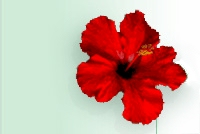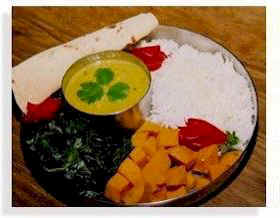

Retreats in Nature
Why Retreat Here
About Ayurveda
About Rasayana
Rasayana Treatments
Fees and Booking
Accommodations/Food
Couples Retreats
Home
About Us
Contact Us
Guests' Remarks
Photo Gallery
Links
Site Map


 Simple, fast, tasty, and nutritious are all the qualities we look for
today in our cooking. There is one more factor that determines if this
meal was prepared with Ayurvedic principles. Is it digestible? Can
grandmother, grandson, and all other members of the family assimilate the
nutrients of the meal and benefit from its nourishment? This is what
qualifies Ayurvedic cooking.
Simple, fast, tasty, and nutritious are all the qualities we look for
today in our cooking. There is one more factor that determines if this
meal was prepared with Ayurvedic principles. Is it digestible? Can
grandmother, grandson, and all other members of the family assimilate the
nutrients of the meal and benefit from its nourishment? This is what
qualifies Ayurvedic cooking.
AGNI
The word "agni" refers to the energy of fire – a transformative
energy. When we eat our digestion acts as a fire cooking the food items
and transforming them into juices that nourish the body's tissues. Dr.
Vasant Lad writes in his textbook on Ayurveda "Many different enzymes are responsible for the transformation of food to energy and Ayurveda uses the term agni to describe these enzymes and metabolic processes."
While considering the foods and method of preparation best suited to your
constitution it is necessary to know the strength of your agni. Most Pitta
individuals have a strong digestive agni while Vata people tend to be
weaker and Kapha persons digest slowly. The best spice to kindle the
digestive fire is ginger. Ayurveda uses a compound called Trikatu which is
a mixture of ginger, long pepper, and black pepper. Noon is the time of
day when the digestive fire is strongest while evening the physiology
slows down. Thus the best time to eat your main meal is at noon. Eating late at night when the digestive agni is low may contribute to ama
– undigested toxins. Increased ama leads to illness.
SEASONS
Ayurvedic cooking considers the seasons and their effects. This refers not only to the seasons of the year but also to life’s seasons. As we age Vata increases and agni lessens. Cooking for the elderly would involve more warm soups, stews and soft foods. During the active middle years Pitta predominates and in childhood Kapha is increased. So when cooking for a Pitta individual aged 20 to 50 years include food that s/he can chew and serve it on time. Pittas tend toward irritability when hungry. For Kaphas in childhood avoid cold dairy as this will increase mucus and congestion. An Ayurvedic cook will choose foods and their preparation according to the temperature of the season and day. On cold winter days warm spices and heavy grains may be used more while in the summer lighter foods such as fruit and vegetable salads may be enjoyed more often.
SIX TASTES
Ayurveda perceives food in terms of the six tastes – sweet, salty, sour, bitter, pungent, and astringent. When cooking for a Vata individual consider using sweet, salty and sour. This would mean cooking with squashes like butternut, sweet potatoes, and puddings. Pitta individuals and summer time cooking need more bitter, sweet, and astringent in their foods. An example of this would be to include more green leafy vegetables such as collards, turnip and mustard greens. For individuals with more Kapha in their constitutions bitter, pungent, and astringent are more balancing. They should avoid the excessive sweet and salty foods so often served in America. For Kapha individuals sweet, salt, and sour need to be avoided while the astringency of beans and bitter green leafy vegetables with pungent spices will be more balancing.
SPICES
Turmeric, ginger, cumin, and coriander are the most commonly used spices in Ayurvedic cooking. Turmeric is bitter and astringent. Ginger is pungent and increases agni. Cumin and coriander assist digestion. To cook a vegetable curry use ¼ tsp. turmeric per person, ¼ tsp. ginger, and ½ tsp. each of cumin and coriander. For sweet dishes like a butternut squash curry add cinnamon to taste.
RECIPES
Ghee - the best of cooking oils, as it is assimilated to deeper tissues.
To prepare ghee heat unsalted butter until the milk solids separate and
sink to the bottom of the pot. When the solids begin to brown take the pot
off the heat and let cool before pouring the ghee into a glass jar.
Vegetable Kitchari. This is an easy one pot meal that can be made with any vegetable and any grain that you choose. One choice may be basmati rice, squash, and beans. You could also use quinoa, peas, and carrots or pasta, broccoli and tomatoes or any mixture that you want. In a pot heat ghee (1 to 2 teaspoons per person). Add vegetables and spices and stir. Then add grain and mix. Add enough water to cook the grains – generally twice as much water as the grain. Millet and buckwheat need much more water, couscous less.
Breakfast grains. Heat ghee in a pot and add cut pecans, bananas, and raisins. Then add oat bran and stir. Add enough water to cook the grain, add raw sugar and cinnamon. Another breakfast dish would be oats, nuts, and apples cooked in the same manner. Or couscous with cashews and raisins.
Digestive Tea and Ayurvedic Chai. To make a tea that may be enjoyed by all doshas and stimulates digestion add finely sliced ginger, a cinnamon stick, licorice stick, and cardamom to a pot of boiling water and steep for 20 minutes on low heat. Drink throughout the day between meals. Chai with the following Ayurvedic touch makes a good morning drink. Place a spoonful of Cafix or Pero in a mug and fill with boiling water. Add a pinch of masala tea mixture or make your own with ginger powder, cloves, cinnamon, and pepper. Add milk and sugar and enjoy a healthy uncaffeinated chai.
Workshops for Ayurvedic cooking may be arranged with Julia Mader. The day focuses on the methods of preparing ghee, Ayurvedic curries according to the season, and a grain kitchari. Please see
Ayurvedic Workshops.

Copyright © 2004-2010 Rasayana Cove Ayurvedic Retreat - All Rights Reserved